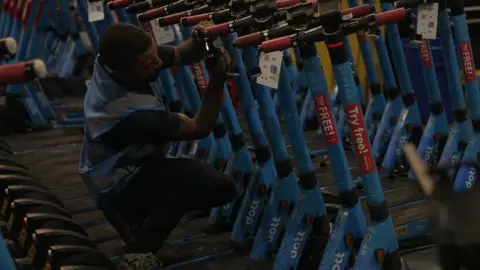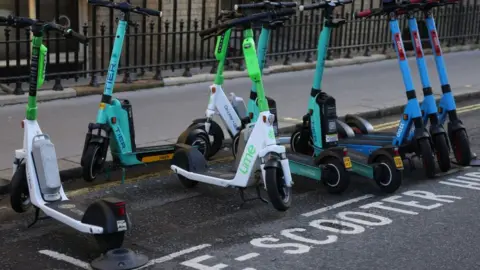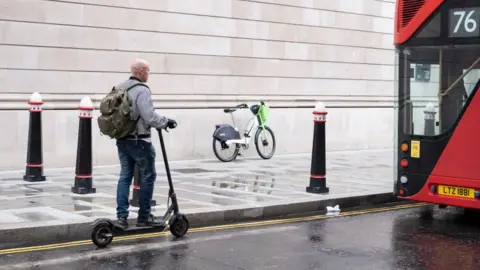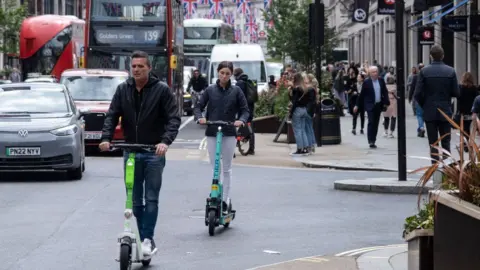Where does London stand on e-scooters?
 BBC
BBCIn a warehouse in Wood Green, in north London, are hundreds of blue Dott e-scooters.
This is where the rental e-scooters are fixed and batteries sent out to replace those on the road.
A trial of e-scooters has been going on in London, and Transport for London (TfL) has announced it's moving to its next phase.
You might have missed it but in 10 boroughs, as part of the trial, you could legally hire an e-scooter and drive it on the road.
In Wood Green we meet the evangelists who - perhaps unsurprisingly - think that e-scooters can change how we get around in the capital.
Some cities see e-scooters as a clean form of transport that can reduce congestion and pollution.
 Getty Images
Getty ImagesThe statistics from the trial are interesting with fewer than 0.01% of trips resulting in serious injury and the rate of serious injuries falling over time.
There were no fatalities and 22 serious injuries. And 87 customers were banned for reckless riding.
Also, the e-scooters have to be parked in designated bays, and Dott says there was a 95% parking compliance reported by operators.
'They're quite safe'
This is London's newest transport mode but it is one that is being deliberately constrained by the trial and heavily regulated.
It is also one that is marred with a bit of confusion.
Michael Venturis, the general manager at Dott in London, says: "It's all about maintaining the scooters and making sure they're safe. Our safety record shows that they have been quite safe."
The rental e-scooters are regulated. They have a top speed of 12.5mph, they have big tyres, lights, indicators and are sturdy.
But stand on any street corner and you will see many private e-scooters. They are unregulated and it's illegal to use them on the road.
Many don't have lights or thick tyres.
 Getty Images
Getty ImagesThere have been a number of deaths from people using their own e-scooters.
In London, we have a regulated rental system and an unregulated free-for-all of private e-scooters. In Paris the opposite has happened.
Their e-scooter rentals have been banned after a referendum but private e-scooters are still allowed.
'Blind people terrorised'
Meanwhile, opponents say all e-scooters should be banned as they encourage poor road behaviour.
Sarah Gayton, from the National Federation of the Blind, tells BBC London that the ban should remain in place with more done to prevent their sale.
"Thirteen of the e-scooter trials in England have already been shut down and the remaining ones also need to halted immediately," she says. "The trials have shown e-scooters cannot be safely regulated."
"Blind, visually impaired and older pedestrians want their pavements and pedestrians spaces back to get around safely without being terrorised by these machines being ridden in all directions at them or left all over the place creating trip hazards and obstructions."
TfL says it will work to reduce the impact of e-scooters on those with disabilities during its trial.
'Untapped potential'
Iqbal Ahmed, the senior policy manager at Dott, says e-scooters are "part of the solution" for cities.
"I think e-scooters plus public transport plus car clubs can really get people out of private vehicles into these low carbon forms of transport," he says.
"About 40% of our trips in London connect with a tube or bus journey, so people are really using them as part of their mix."
Mr Ahmed believes this mode of transport has a lot of "untapped potential" in London.
Data from the trials is being used to improve future regulation around e-scooters.
TfL says the data from the trial is being used to develop policy on potential wider e-scooter use within the city.
It announced on Monday that due to the low number of serious injuries, the second phase of the e-scooter trial will go ahead.
 Getty Images
Getty ImagesHelen Sharp, TfL's trial lead, says: "The successes of the first phase of the trial and efforts from these operators alongside London councils and the participating boroughs allow us to build on this."
The government says when parliamentary time allows, it intends to introduce legislation for micromobility vehicles and create a new Low-speed Zero Emission Vehicle (LZEV) category.
It's believed this would cover both rental and private e-scooters.
The problem is the longer the delay, more of the unregulated illegal models appear on the streets.
At the moment in London, the slow moving regulation has been overtaken by the reality.
